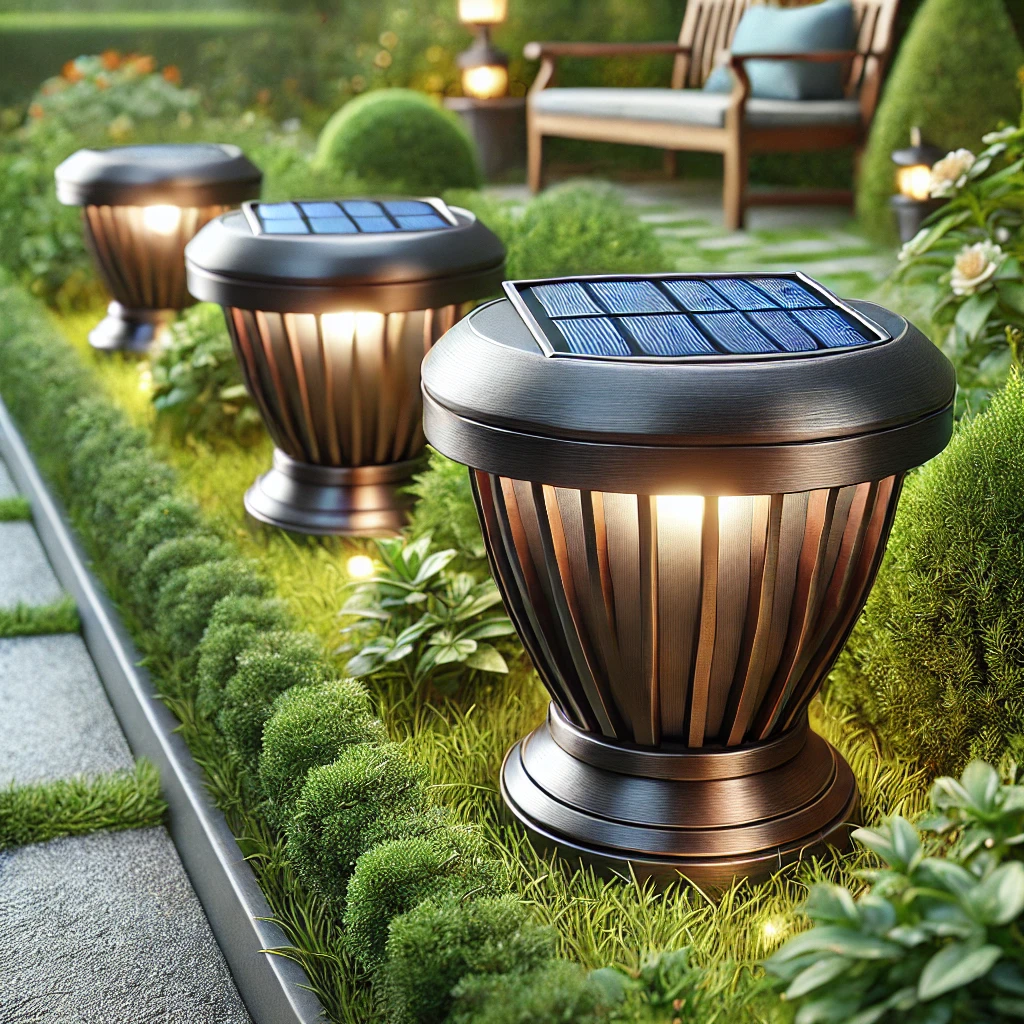Ultimate Guide to Solar Lights for Outdoor Use – Types, Benefits, and Tips

1. Introduction
What Are Solar Lights?
Solar lights are outdoor lighting solutions that harness the power of the sun to provide illumination. They feature solar panels that capture sunlight, convert it into electrical energy, and store it in batteries for later use.
Benefits of Using Solar Lights
Solar lights offer numerous advantages, including energy efficiency, low operating costs, and ease of installation. They eliminate the need for wiring and reduce your electricity bill while providing a sustainable lighting option.
2. Types of Solar Lights
Solar Pathway Lights
These lights are designed to illuminate walkways and garden paths. They usually feature a stake that can be inserted into the ground, making them easy to install and reposition.
Solar Flood Lights
Solar flood lights provide high-intensity illumination and are ideal for lighting up large areas such as driveways or outdoor events. They are typically mounted on a wall or post.
Solar String Lights
Solar string lights add a decorative touch to outdoor spaces. They are perfect for creating ambiance in gardens, patios, and balconies, and are available in various colors and designs.
Solar Spotlights
Solar spotlights are used to highlight specific features in your garden, such as trees, statues, or architectural elements. They can be adjusted to focus light in different directions.
3. How Solar Lights Work
Solar Panels and Energy Conversion
Solar lights operate using photovoltaic cells that capture sunlight and convert it into electrical energy. This energy is stored in batteries during the day and used to power the lights at night.
Battery Storage and Performance
The batteries in solar lights store the energy collected by the solar panels. They are typically rechargeable and have a lifespan of several years. The performance of solar lights can vary based on battery quality and sunlight exposure.
Light Sensors and Timers
Many solar lights are equipped with light sensors or timers that automatically turn the lights on at dusk and off at dawn, or after a set period. This feature helps conserve battery life and ensures the lights operate efficiently.
4. Choosing the Right Solar Light
Consider Your Lighting Needs
When selecting solar lights, consider the specific areas you want to illuminate. Pathway lights are great for walkways, while flood lights are better for larger spaces. Assess your lighting needs to choose the appropriate type.
Brightness and Lumens
Brightness is measured in lumens. Higher lumens mean brighter light. Choose solar lights with the right lumen output based on the area you need to light up. For example, pathway lights typically require fewer lumens than flood lights.
Durability and Weather Resistance
Look for solar lights made from durable materials that can withstand various weather conditions. Waterproof and rust-resistant features are essential for longevity and performance.
Design and Aesthetics
Solar lights come in a range of designs, from modern to traditional. Select a style that complements your outdoor décor and enhances the visual appeal of your space.
5. Installation Tips
Placement and Positioning
Place solar lights where they can receive maximum sunlight exposure during the day. Avoid shaded areas from trees or buildings, as this will affect their charging efficiency.
Preparing the Ground
For lights with stakes, ensure the ground is soft and free of debris for easy installation. For wall-mounted lights, use appropriate mounting hardware and follow the manufacturer’s instructions.
Common Installation Mistakes
Common mistakes include placing lights in shaded areas or improperly aligning them. Ensure that solar panels are facing the sun and that lights are securely installed to avoid operational issues.
6. Maintenance and Care
Cleaning and Upkeep
Regularly clean the solar panels with a soft cloth to remove dirt and debris that can obstruct sunlight. Check the batteries periodically and replace them as needed to maintain optimal performance.
Troubleshooting Common Issues
If your solar lights are not working, check if the batteries need replacing or if the solar panels are covered in dirt. Ensure the lights are positioned correctly and receiving adequate sunlight.
7. Environmental Impact
Energy Savings and Eco-Friendliness
Solar lights reduce reliance on conventional electricity and lower your carbon footprint. They provide an eco-friendly lighting solution by using renewable solar energy.
Reducing Carbon Footprint
By switching to solar lights, you contribute to reducing greenhouse gas emissions and conserving non-renewable resources, making it a sustainable choice for outdoor lighting.
8. Expert Insights
Insights from Industry Experts
“Solar lighting technology has come a long way in recent years,” says Jane Doe, an industry expert. “Advancements in battery life and panel efficiency mean that solar lights are now more reliable and versatile than ever before.”
Case Studies of Effective Use
Case studies show that well-designed solar lighting systems can significantly enhance outdoor spaces, providing both functional and aesthetic benefits. For instance, many commercial properties use solar lights to illuminate parking lots and enhance security.
9. Future Trends in Solar Lighting
Innovations in Solar Technology
Future trends include advancements in solar panel efficiency and battery storage technology. Innovations such as smart solar lights with integrated sensors and connectivity features are also emerging.
Emerging Designs and Features
New designs in solar lighting include customizable color options and interactive features. These innovations aim to provide more flexibility and personalization in outdoor lighting solutions.
10. Conclusion
Summary of Key Points
Solar lights offer a practical, energy-efficient, and eco-friendly lighting solution for outdoor spaces. With various types and styles available, you can find solar lights to meet your specific needs.
Final Recommendations
Investing in quality solar lights can enhance your outdoor areas while saving on energy costs. Choose lights based on your needs, ensure proper installation, and maintain them regularly for the best performance.
11. FAQ
How long do solar lights last?
Solar lights typically last between 2-5 years, depending on the quality of the materials and battery. Regular maintenance can extend their lifespan.
Can solar lights work in cloudy weather?
Yes, solar lights can work in cloudy weather, although their performance may be reduced. They rely on daylight rather than direct sunlight to charge.
How do I maximize the efficiency of my solar lights?
To maximize efficiency, ensure that solar panels are kept clean and placed in areas with maximum sunlight exposure. Regular maintenance and battery replacement also help maintain optimal performance.

